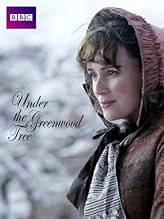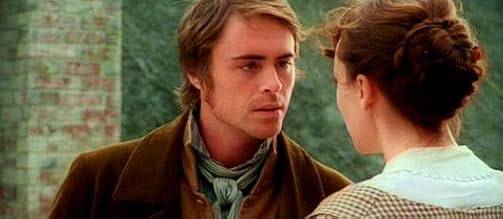Añade un argumento en tu idiomaIn this lighthearted romance from Victorian novelist Thomas Hardy, the beautiful new village school teacher is pursued by three suitors: a working-class man, a landowner, and the vicar.In this lighthearted romance from Victorian novelist Thomas Hardy, the beautiful new village school teacher is pursued by three suitors: a working-class man, a landowner, and the vicar.In this lighthearted romance from Victorian novelist Thomas Hardy, the beautiful new village school teacher is pursued by three suitors: a working-class man, a landowner, and the vicar.
Imágenes
- Robert Penny
- (as Terence Mortimer)
- School Child
- (sin acreditar)
- Mr. Shiner's Maid
- (sin acreditar)
Argumento
¿Sabías que...?
- CuriosidadesWhen they are walking home from the Christmas party at the Dewy house. Mr. Shinar tells Fancy that he's best known from their town to Casterbridge. Thomas Hardy wrote both Under The Greenwood Tree and The Mayor of Casterbridge.
- PifiasWhen Fancy Day is first introduced to the villagers and Parson Maybold, her hair style changes from a full ponytail to a half ponytail between shots.
- Citas
Fancy Day: You get over a broken heart very quickly, Mr. Dewy, if that's indeed what it was.
Dick Dewy: Not true, Miss Day. Tis broken and will remain so till the day you fix it.
Fancy Day: You'll be waiting until you turn to stone, then.
[stares intently, then kisses him]
Dick Dewy: I knew you felt the same, Fancy, I knew it. I tasted it on your lips the first time I kissed you.
Fancy Day: Take me home, please.
Dick Dewy: Say you'll be mine, Fancy.
Fancy Day: You know I cannot.
- ConexionesEdited into Masterpiece Theatre: Under the Greenwood Tree (2006)
- Banda sonoraIn Bethlehem He was Born
Traditional
Written by Thomas Ravenscroft
The young schoolmistress newly arrived in a small rural village is sought in marriage by each of the three men who fall in love with her. But in this tale nothing, not even romance, proves quite as simple as first it appears.
We discover that the woman, Fancy Day (Keeley Hawes), is herself the product of a classic misalliance. Torn between the conflicting classes and cultures of her heritage, she feels herself part of neither. Her great life challenge is finding where she belongs in the world, and this internal conflict deeply colours her struggle to choose among her three suitors.
None of the three suitors, however, is quite what he first seems either and yet each, in his own particular way, does love this woman.
The richest man in the area, Farmer Shiner (Steve Pemberton) we learn is a self-made man of a uniquely 19th Century sort. He may be descended from the traditional English yeoman farmers who had been small freeholders since Saxon days. But the technological advances of the Industrial Revolution would increasingly benefit larger scale farms over small. Farmers who, like Mr. Shiner, had the daring and foresight to increase their holdings beyond that held by their fathers were best positioned to survive and prosper under these new economic conditions.
Parson Maybold (Ben Miles) represents traditional birth and education, as opposed to new money, in the world of this village. But even he describes himself as a 'modern man' who believes in 'Progress'. As Mr. Maybold says in his Christmas Day sermon at the film's outset, 'The world is changing, and we must change with it.' To this end, he has hired Miss Day as village schoolmistress, so that even the poorest children in the area will learn basic skills they may need to cope with the changing world. All these values would have sounded alien just a generation before.
Yet it is the man who initially appears most straightforward who ultimately proves the most complex: Dick Dewy (James Murray), whose family have been the local carters or carriers in the area since time immemorial. When we first meet young Dick he seems simple, lighthearted, and uncomplicated. But as the story progresses, the challenge he faces becomes nothing less than the great social revolution of the 19th Century: men suddenly realising that their life choices need not echo that of their fathers. The evolving relationship between Dick and his father, Reuben Dewy (Tony Haygarth) is central not just to the film but to our understanding of the whole era. Dick's response to what I shall describe only as the 'Tea Incident' subtly presents a Declaration of the Rights of Man. Dick's later victory for self-respect thus becomes, in a sense, a victory for us all.
I find it significant that in this story the gentry, or traditional ruling class, is completely absent. This would not have been possible in an earlier generation. Jane Austen, for instance, could not have written this story. But by 1840 (when our story was set), and even moreso by 1872 (when the original novel was published), the real power structures throughout the rapidly industrializing world were changing, making omission of the gentry in both book and film not only reasonable but appropriate.
This recent BBC release of "Under The Greenwood Tree" is distinguished by brilliantly nuanced performances, not just from all principal actors but an extraordinarily strong supporting cast. Special credit is due Ashley Pharaoh for a truly inspired screenplay which is both more focused and more emotionally moving than Thomas Hardy's rather rambling original novel.
Beautifully realised in every detail, this village of Mellstock exists simultaneously nowhere and everywhere. This is a romantic idyll of a time and a place where even the village idiot, Thomas Leaf (deliciously played by Richard Leaf), could feel accepted and part of a warm and loving community whatever deep currents disturb its deceptively still waters.
10 out of 10. Highest recommendation.
- sshogben
- 17 oct 2007
- Enlace permanente
Selecciones populares
Detalles
- Fecha de lanzamiento
- Países de origen
- Sitio oficial
- Idiomas
- Títulos en diferentes países
- Under the Greenwood Tree
- Localizaciones del rodaje
- Empresas productoras
- Ver más compañías en los créditos en IMDbPro
Contribuir a esta página
























